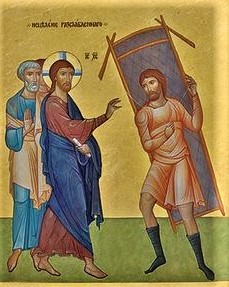I have no man… – Fr. Gavril Galev
~+~
This historical event (see John 5,1-15) from the life of the God-Man Jesus examines (looks into) many questions of Orthodox symbolism and the life of man in general.
First of all, we can see the theme of the meaning and the comparison between the Old and the New Testament. Next, the bath signifies the Holy Sacrament of Baptism through which man is born for life eternal. The movement of water symbolizes the grace of God. Also, this event symbolizes the repentance and zeal with which that baptising grace moves within us – It transforms us and heals our passions, etc.
In this event we can also analyse the psychological structure of a group of people who call themselves righteous and fulfillers of the law. Who, in fact, possessed by the sufficiency of their own ego and vanity, filled with the perfidious passions of egoism, vanity, high self-esteem, selfishness, envy, jealousy, etc., cannot see the truth and correctly set the real values in life in which man is the holiest thing and therefore they set their false principles above love.
That way, they close their hearts for other people and unconsciously persecute and kill God (in man). Such “righteous” Pharisees, just like the Jewish elders, if they take hold of leadership positions in the hierarchy, become persecutors of Christ: “They persecuted Jesus and wanted to kill him.”
They blinded themselves, their hearts have turned into stone and they show no mercy and love towards their fellow man, so, in the name of some law, they trample and kill certain (concrete) people.
But there is also a moment that is little bit hidden from the eye of an ordinary man, but not for the holy fathers, who interpret the character of the weakened person (paralytic).
That man (Paralytic), according to the Holy Fathers, is exactly the one who later slapped Jesus on the face when He was in the court before the High Priest Caiaphas. Therefore Christ, when He found him after the event (after He healed him), addressed him and warned him: “See you have been made well. Sin no more, lest a worse thing come upon you.” (John 5:14).
Because not only the body suffers, but the soul suffers more, and that is worse, but the worst thing is when we kill our own soul and send it to hell.
Our Saviour Jesus Christ, Who knows even the most hidden secret areas of the human heart, knew this man also. However, as a philanthropist, He gave him a chance. But the man, who was distorted not only in the body, but also in the soul, blinded by the passions, was not touched by the words of Christ and the memory of the good deed He did to him. Therefore first of all, after realising that Christ was the “man” Who helped him and whom the Pharisees were seeking, slandered Him, and later (in the court before the High Priest Caiaphas) even slapped Him for no reason.
This action testifies as to the character of that person who practically had no one close to help him and take him to the pool. To be for 38 years sick and not to have anyone close, tells us that this man really had horrid character, and everyone’s patience had grown thin, and they abandoned him and left him. Because, most often, people behave towards us, just the same as we behave towards them, therefore we should not seek the blame in others, but in ourselves.
Let us pray; “May the Lord gives us wisdom and intelligence, and let us open our heart to God, so through His grace, may we have love amongst ourselves. Let us not be like those “righteous people” who out of envy wanted to kill Christ. Let us not be like this weakened (Paralytic) person that was left alone without anyone. But by learning from their example of how we ought not to be, let us open our hearts so the grace of God can work in us and transform us into good people. Amen
Fr. Gavril Galev
Abbot of the Monastery “St. Clement of Ohrid”,
Kinglake, Melbourne, Australia
Sunday of the Paralytic
29th of April 2018

